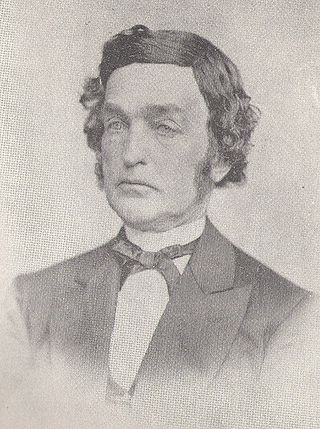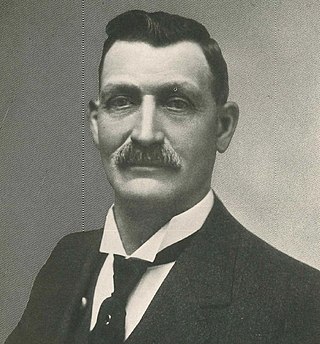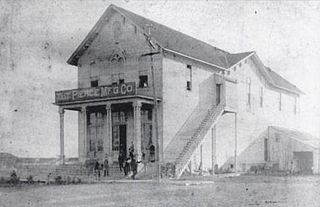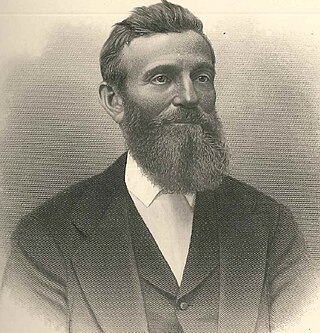
Ludington is the largest city and county seat of Mason County in the U.S. state of Michigan. As of the 2010 census, the city population was 8,076.
The Pere Marquette Railway operated in the Great Lakes region of the United States and southern parts of Ontario in Canada. It had trackage in the states of Michigan, Ohio, Indiana and the Canadian province of Ontario. Its primary connections included Buffalo; Toledo; and Chicago. The company was named after Père Jacques Marquette S.J. (1637–1675), a French Jesuit missionary who founded Michigan's first European settlement, Sault Ste Marie.
Pere Marquette or Jacques Marquette (1637–1675) was a French Jesuit missionary and namesake of Marquette University.

White Pine Village is an outdoor museum in Ludington, Michigan, containing nineteenth-century buildings and related historical items. The thirty buildings in the village contain artifacts relating to pioneer lumbering, music, farming, shipping, sports, and businesses. Occasionally performances are done on blacksmithing, spinning, leatherworking, candlemaking, wood carving, and basket making. The museum's centerpiece is an 1849 farmhouse.
The Flint and Pere Marquette Railroad (F&PM) is a defunct railroad which operated in the U.S. state of Michigan between 1857 and 1899. It was one of the three companies which merged to become the Pere Marquette Railway.

Aaron Burr Caswell (1807–1896) was an American frontiersman and the first white man to occupy any part of Mason County, Michigan. He became the county's first coroner, probate judge and surveyor; and constructed its first framed building that functioned as a home, courthouse and jail—it is also the only surviving landmark of Mason County's earliest history. Caswell was also the progenitor of a prominent Mason County family.

James Ludington was an American entrepreneur, businessman, lumber baron, and real estate developer. As a businessman he would loan money to other businessmen. In one such loan he had to foreclose for delinquent payments on a sawmill operation in Michigan. He ultimately obtained the sawmill in the village of Pere Marquette. Ludington platted the land there and formed a town with a lumber company operation. He sold his interest to the lumber company for a large sum of money and became wealthy. The town later changed its name and became Ludington, Michigan, although he never lived there.
The Ludington Public Library is one of the two branches of the Mason County District Library administrative system. This library, as the main branch, is located in downtown Ludington, in Mason County in the Lower Peninsula of Michigan. The library started as in 1872 as an association. A 90-day trial for a free reading room was undertaken; later a small structure was acquired for a definitive reading room.

Charles Mears was a Michigan lumber businessman, capitalist, merchant, transportation executive, engineer, and farmer. He owned thousands of acres of timber in Michigan, and had 15 sawmills to produce lumber. Mears built cargo boats to transport his lumber to Chicago, and developed several harbors in western Michigan.

Eber Brock Ward was an American industrialist, iron and steel manufacturer, and shipbuilder. He was known as the "steamship king of the Great Lakes" and the "first of the iron kings." Ward became Detroit's first millionaire. His steel factories made him, in his time, the wealthiest man in the Midwest.

Antoine Ephrem Cartier was a 19th-century American businessman who assisted in the development of Ludington, Michigan. He was a business owner, stock speculator, lumber tycoon, sawmill owner, and real estate investor. He was mayor of Ludington from 1880 through 1888 and progenitor of a line of mayors sharing his Cartier name.

Warren Antoine Cartier was a 19th-century northern Michigan businessman who helped establish Ludington, Michigan. He was twice elected mayor of the city and was the owner of several businesses, a banker, a lumber tycoon, a sawmill owner/operator, and a real estate investor. In civic life, he was involved with many societies and organizations.

Justus Smith Stearns was an American lumber baron and businessman. He was involved in many enterprises that involved commercial real estate development, sawmills, coal mining and sales, farming, railroading, and electrical technology. He started his lumber pursuits as a teenager at his father's sawmills. This expereience and business knowledge. learned from his father, led to his becoming a lumber merchant in his twenties.

Rasmus Rasmussen (1850–1921) was an American merchant and businessman of Manistee and Ludington, Michigan. He operated a Great Lakes schooner and was in the lumber business transporting lumber related material around Lake Michigan. He also owned and operated a boardinghouse and saloon.

William Albert L. Rath was a German expatriate living in America. He was known for developing Mason County and Ludington, Michigan. Rath was a lumber baron, business magnate and philanthropist. He was mayor of Ludington for one term and a member of the Ludington Board of Trade. He was a member of the Ludington board of aldermen and the county board of supervisors.

The Pere Marquette Lumber Company was a lumber, salt, sawyering and merchandising company of the nineteenth century. Its initial purpose was as an asset management company. The holdings were that of James Ludington, a lumber baron. The business firm was the cradle for the development of the city of Ludington, Michigan. The company was an important component of the lumber boom and bust in the area, supplying lumber for hundreds of thousands of homes and other structures in the Midwest. It was one of the largest producers of salt in the state of Michigan. The company was active from 1869 to 1897 and later sold.

Edward Augustus Foster was a nineteenth century businessman and lumber tycoon known for helping to develop various lumber businesses.

John Mason Loomis was a nineteenth-century American businessman and lumber tycoon from Chicago who was known for developing the city of Ludington, Michigan. He was involved with the Pere Marquette Lumber Company, which also operated salt distilleries that in turn influenced the salt industry of northern Michigan. The village of Pere Marquette benefited from these local industries and developed into the city Ludington.

Delos L. Filer was a businessman famous for developing Manistee County and the towns of Manistee, Filer City and Ludington in the state of Michigan. He owned sawmills and related businesses and was a physician, a merchant, a lumber baron, a real estate developer, and a philanthropist.















